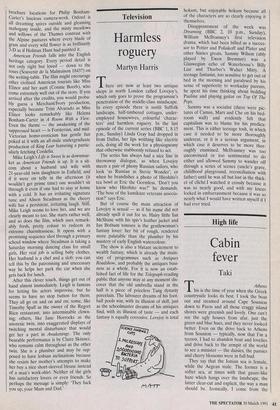Television
Harmless roguery
Martyn Harris
There are now at least two antique shops in north London called Lovejoy's, which only goes to prove the programme's penetration of the middle-class mindscape. In every episode there is sunlit Suffolk landscape, half-timbered cottages, under- employed housewives, colourful 'charac- ters' and harmless roguery. In the last episode of the current series (BBC 1, 8.15 p.m., Sunday) Linda Gray had dropped in from Dallas, her lips writhing like electric eels, doing all the work for a physiognomy that otherwise stubbornly refused to act.
The series has always had a nice line in throwaway dialogue, as when Lovejoy meets a pair of phony Russian sailors, who look `as Russian as Stevie Wonder', or when he brandishes a photo of Hirohito's tea bowl at Eric the Gormless. 'Don't you know who Hirohito was?' he demands. `The boss of the kamikaze veterans associa- tion?' says Eric.
But of course the main attraction of Lovejoy is sexual — as if his name did not already spell it out for us. Hairy little Ian McShane with his spiv's leather jacket and Ian Botham tonsure is the gentlewoman's fantasy lover: her bit of rough, rendered more palatable than the plumber by his mastery of early English watercolour.
The show is also a blatant incitement to wealth fantasy, which is already the main- stay of programmes such as Antiques Roadshow, and probably the antiques busi- ness as a whole. For it is now an estab- lished fact of life for the Telegraph-reading public that anyone may at any moment dis- cover that the old umbrella stand in the hall is a piece of priceless Tang dynasty porcelain. The labourer dreams of his foot- ball pools win, with its illusion of skill, just as the schoolmaster dreams of his antiques find, with its illusion of taste — and each fantasy is equally corrosive. Lovejoy is total hokum, but enjoyable hokum because all of the characters are so clearly enjoying it themselves.
Disappointment of the week was Dreaming (BBC 2, 10 p.m., Sunday), William Mcllvanney's first television drama, which had been billed as a succes- sor to Potter and Poliakoff and Plater and other Sixties greats. Sammy Wilson (ably played by Ewen Bremner) was a Glaswegian echo of Waterhouse's Billy Liar and Thurber's Walter Mitty. A teenage fantasist, too sensitive to get out of bed in the morning and paralysed by his sense of superiority to workaday parents, he spent his time thinking about bedding Pauline and playing guitar on Top Of The Fops.
Sammy was a socialist (there were pic- tures of Camus, Marx and Che on his bed- room wall) and evidently felt that capitalism was to blame for his predica- ment. This is either teenage tosh, in which case it needed to be more thoroughly undercut, or it is a serious argument, in which case it deserves to be more thor- oughly examined. Mcllvanney was too unconvinced or too sentimental to do either and allowed Sammy to wander off through a series of scenes (uncle's grave, childhood playground, reconciliation with father) until he was all but lost in the thick- et of cliche.I watched it crossly because it was so nearly good, and with my knees locked in embarrassment because it was so nearly what I would have written myself if I had ever tried.


















































 Previous page
Previous page